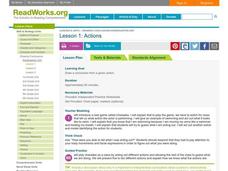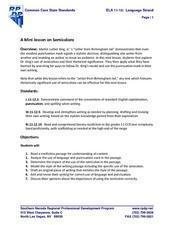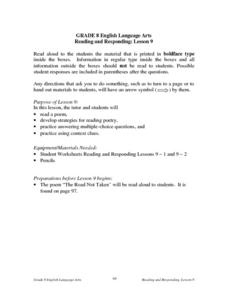Curated OER
Actions
Young scholars pair up and one of the students acts out an action while the other draws conclusions from their actions by drawing a picture of what they are doing. In this actions lesson plan, young scholars play charades and guess what...
EngageNY
Speech Writing: Identifying Criteria for a High Quality Conclusion
Learning is never-ending. Scholars learn about effective conclusions as they continue watching a video of an opinion speech. After analyzing the speech's conclusion, they work in small groups to write an ending for their own speeches.
Curated OER
Short Story
Students draw conclusions from the short story Ssssssilent Hunter and listen to the clues to find out what animal is being described. In this drawing conclusions lesson plan, students explain why they think the animal is what they...
Curated OER
Drawing Conclusions - Is This a Map of the Underground Railroad?
Students complete activities to study potential maps of the Underground Railroad. In this Underground Railroad lesson, students watch a video about map collector Anne Zorela's Underground Railroad map. Students complete a graphic...
Curated OER
Things Aren't Always What They Seem
Students use video and the Internet to make predictions, draw conclusions, determine conflict and point of view while reading a short story. In this short story analysis lesson, students watch a related video and complete a prediction...
Curated OER
Explicit Information versus Drawing Conclusions
Third graders identify explicit information and draw conclusions from text. In this instructional lesson, 3rd graders review models of each question type (explicit and conclusion) and practice reading a passage to answer questions.
Curated OER
Filling the Holes, 20 Years Later
Students learn to analyze traits of the main character after reading Holes by Louis Sachar. In this character analysis lesson, students illustrate one of the characters at their workplace 20 years in the future.
Southern Nevada Regional Professional Development Program
A Mini lesson on Semicolons
Dr. Martin Luther King, Jr.'s "Letter from Birmingham Jail" serves as an exemplar for a mini-activity on semicolons. Working alone or in small groups, class members first circle all the semicolons in the letter, and then consider how...
Curated OER
The Gingerbread Boy Comes Alive
Students make cut-out gingerbread cookies. After reading "The Gingerbread Boy", their cookies "disappear" and students must make predictions and draw conclusions about what happened to their cookies.
Curated OER
Big Bushy Mustache: comprehension skills
In this comprehension skills worksheet, students read the book Big Bushy Mustache and complete comprehension activities. Students complete 5 activities including note taking, making inferences, fiction and non fiction, drawing...
CPALMS
Analyzing Vonnegut's View of the Future and His Commentary on the Present in Harrison Bergeron
Kurt Vonnegut's short story "Harrison Bergeron" engages adolescents with its theme about the dangers of complete societal equality. Learners complete a graphic organizer to track literary elements in the story, as well as an inference...
Curated OER
Identify Cause and Effect
Students listen to a story about school in a one-room schoolhouse. In this cause and effect lesson, students create a Venn diagram to find the similarities and differences in schools then and now. Students discuss how past events help...
Curated OER
Author's Opinion
Students complete a worksheet. In this author's opinion lesson, students learn how to determine an author's opinion when it is not explicitly stated in the text. Students answer fact and opinion questions and use them to draw...
Curated OER
Town Hall: comprehension skills
In this comprehension skills worksheet, students read the book Town Hall and complete comprehension activities. Students complete 5 activities including synthesizing, main idea/details, making inferences, and drawing conclusions.
Roald Dahl
The Twits - The Twits Get the Shrinks
Turn readers into investigative journalists. The 11th and final lesson that accompanies The Twits by Roald Dahl asks the question "What happened to Mr. and Mrs. Twit?" The lesson uses mind maps and group discussion to help answer the...
Curated OER
Playing Historical Detective: Great Grandmother's Dress and Other Clues to the Life and Times of Annie Steel
Students draw conclusions about an mystery person based on documents and artifacts provided. In this drawing conclusions instructional activity, students become detectives by reading and analyzing evidence provided. This instructional...
Curated OER
The Westward Movement
Students study the westward movement through examining stamps. In this westward movement lesson plan, students draw conclusions, determine cause and effect relationships and examine the westward movement of the United States by...
Nancy Fetzer's Literacy Connections
Expository Paragraph
Upper elementary and middle school writers learn how to craft an expository paragraph by following the six steps detailed in a 48-page instructional guide. Learners learn how to write six different types of informational paragraphs: to...
Curated OER
Wrap it up!
Sometimes the conclusion of an essay can be the most important part. Whether your writers are ending with a proposition, lesson learned, or persuasive argument, teach them how to "end with a bang" with this helpful PowerPoint! This...
K20 LEARN
The Sirens: Is It a Bird or Is It a Fish?
Fish, fowl, foul fish, or foul fowl? Just what is a siren? Young scholars listen to a video clip and draw what they imagine when they hear the word "siren." After watching several videos depicting sirens, class members read "The Sirens'...
Curated OER
Reading and Responding -- Lesson 9
Fourth graders work independently or in a small group with a tutor or teacher to (1) read a nonfictional selection, (2) practice drawing conclusions, (3) identify main ideas, and (4) practice responding to cause and effect questions.
Curated OER
Lesson 2: Important Person
What kid wouldn't love to learn about George Washington? The class reads a simplistic biography about George Washington to find out why he is so famous. They chart the things he did, as well as what makes a non-fiction book a biography....
Curated OER
Fish Communities in the Hudson
Learning to read data tables is an important skill. Use this resource for your third, fourth, or fifth graders. Learners will will study tables of fish collection data to draw conclusions. The data is based on fish environments in the...
Curated OER
Identifying Missing Words
How do you figure out the meaning of a word you don't know? Young readers develop skills to identifying missing words in a story using context clues. Picture clues are used to identify covered words in the story I Can’t Get My Turtle to...

























